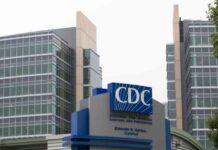Millions of Americans have found themselves without health insurance coverage as state Medicaid programs have reduced their coverage, leading to an increase in the national uninsured rate from 7.7% to 8.2% earlier this year, according to data released by the Centers for Disease Control and Prevention.
The previous record low uninsured rate of 7.7% did not take into account those who were losing their Medicaid coverage. The CDC reported that as of March 2024, more than 27 million people in the United States had no form of health insurance, up from over 25 million in the same period in 2023. This data was collected as part of the CDC’s quarterly National Health Interview Survey, revealing that over 1 million working-age adults and 700,000 children under 18 lost their coverage.
During the COVID-19 pandemic, states were prohibited from removing individuals from their Medicaid programs. However, these protections ended in April 2023, allowing states to reassess individuals’ eligibility based on their income. Since then, nearly 25 million people have lost their Medicaid coverage due to eligibility reassessments, with some facing termination of coverage due to errors in outdated computer systems and clerical mistakes.
While many individuals who lost Medicaid coverage transitioned to other forms of insurance, such as purchasing health plans through state and federal marketplaces established by the Affordable Care Act or moving to workplace health plans, millions of people remain uninsured. The ACA marketplaces have seen a surge in enrollment, with over 16.6 million individuals having ACA health plans as of March, according to the CDC’s report.
Health insurance companies offering subsidized ACA plans, like Centene and Molina Healthcare, have reported profits from the increase in enrollments. Centene’s CEO, Sarah London, highlighted the positive shift in the ACA marketplace during the company’s recent earnings call, noting the expanding market opportunities.
Despite efforts by the federal government to work with states to facilitate automatic Medicaid renewals, there are significant backlogs reported in these renewal processes. This indicates that there are still challenges in ensuring that individuals maintain continuous health insurance coverage.
The data underscores the importance of addressing gaps in health insurance coverage and ensuring that individuals have access to affordable options for maintaining their health and well-being. As the landscape of health insurance continues to evolve, it is crucial to prioritize policies that promote comprehensive coverage and reduce the number of uninsured individuals in the country.


















